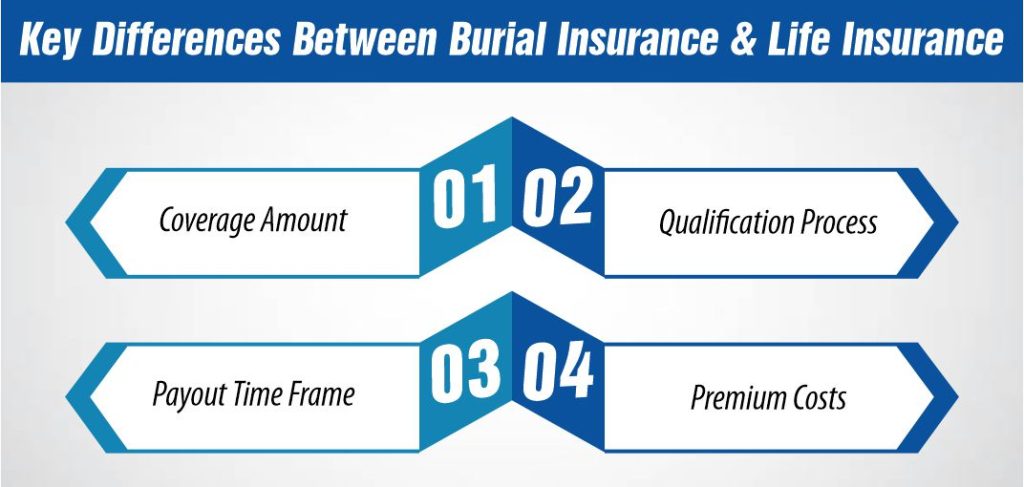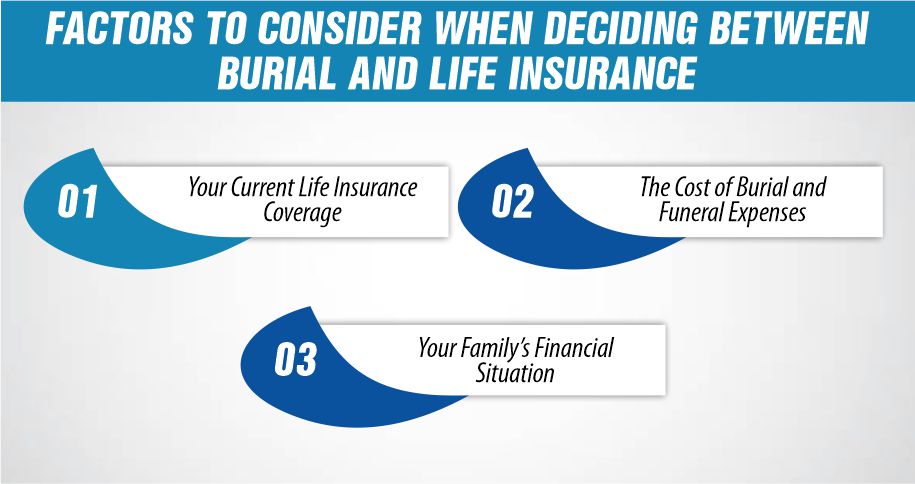Last Updated on: February 25th, 2025
Reviewed by Kyle Wilson

Every person should consider purchasing life insurance because it secures their family’s finances in the future. People often ask if acquiring burial insurance is needed when they already possess life insurance products. Burial insurance differs from general life insurance by providing funeral expenses coverage which shields your family members from paying for unexpected burial costs. Knowing how burial insurance policies differ from life insurance as well as their combined functions will lead you to choose optimal financial planning decisions.
Get Free Quotes
Customized Options Await
Burial insurance together with life insurance exist to safeguard family members through monetary protection after a policyholder perishes. However, they serve different purposes.
Burial insurance exists as a specialized form of life insurance which specifically allocates benefits for depicting graveside ceremonies together with cremation expenses along with supplementary funeral costs. The coverage ranges between $5,000 and $25,000 while the application process remains easier than the one required for traditional life insurance. Burial insurance plans give approved access to people with pre-existing health issues while avoiding medical examinations for all policyholders.
Life insurance serves as a broad financial tool which distributes death benefits to family members when the policyholder dies. People use life insurance for different objectives from paying debts to leaving an inheritance and funding education or replacing lost income because of death. Life insurance exists in two primary categories along with different levels of coverage for which eligibility criteria differ. Life insurance differs slightly from burial coverage since policy access and premium costs depend on health condition and age of policyholders during medical evaluations.
While both burial insurance and life insurance provide financial support to beneficiaries, they serve different purposes:

Burial insurance provides added utility even to people who hold existing life insurance policies. Funeral costs might become expensive while life insurance settlements need time to complete their process.
Average funeral costs exceed $7000 and may climb up to greater than $10000. Burial insurance exists specifically to handle funeral expenditures while keeping the designated life insurance benefits available for mortgage payments along with family income support.
Life insurance claim processing takes extensive time because complete verification and documentation requirements exist. Burial insurance functions to distribute payment funds at a fast pace so families can handle premature funeral costs effectively while skipping lengthy delays or financial burdens.
A person who possesses burial insurance and life insurance achieves enhanced financial security coverage. The coverage preserves funeral expenses separate from the life insurance death benefit hence beneficiaries maintain access to their policy’s principal funds. People looking to reduce financial obligations on their families can successfully use these dual insurance policies as a practical combination.
Selecting between burial insurance or life insurance demands an assessment of your finances alongside your persistent financial requirements. Therefore both policies function differently though they deliver financial security. Several criteria should be evaluated when you decide.
Evaluating your existing life insurance policy will reveal whether the coverage meets your expenses for funerals in addition to other financial commitments. The primary purpose of life insurance helps users replace incomes and pay debts and provides financial support for future needs of their beneficiaries. A specific burial insurance policy stands as a separate coverage to safeguard funeral costs from reducing your life insurance funds when they are dedicated to other purposes.
The cost of funerals varies between $7,000 to $15,000 and beyond according to specific location and selected services. A person whose family faces financial struggles with immediate funeral costs often finds burial insurance services beneficial to secure money specifically for those expenses. Money from life insurance payouts goes through an extended processing time but burial insurance disbursements allow homeowners instant accessibility.
You should evaluate how much savings and financial resources your family maintains for funeral costs. Burial insurance becomes unnecessary in these circumstances where life insurance proceeds will adequately provide end-of-life expenses because savings are sufficient. The cost of funeral arrangements might prove manageable through burial insurance which acts as financial protection for beneficiaries who need help with funeral costs.

When deciding between burial insurance and life insurance, carefully evaluate your existing financial plans, family needs, and ability to afford premiums.
Your decision regarding burial insurance purchase depends on the alignment of your financial goals with your family’s funeral expense requirements while already holding life insurance policies. The financial protection offered by life insurance extends beyond burial insurance which creates a specific fund to cover funeral expenses thus relieving your family from costly unforeseen bills. Having burial insurance proves beneficial as a practical solution when the processing time or allocation of your current life insurance policy fails to sufficiently fund your burial needs. A thorough review of your current financial arrangements together with funeral expense costs and personal financial health will show if you need an extra policy.
Burial insurance exists as a specialized coverage designed to fulfill the final expenses connected to death through funeral costs and burial needs as well as medical bills from the policyholder's passing. The payout from life insurance surpasses burial insurance benefits which allows policyholders to fulfill many financial priorities including estate inheritance.
The coverage limits of burial insurance remain lower than life insurance premiums thereby producing more cost-efficient policies between $5,000 and $25,000. Life insurance policies pay out larger amounts of money while requiring medical exams to become more expensive than burial insurance. Life insurance provides monetary security which extends past cost coverage for funerals.
Burial insurance and life insurance exist together in the coverage plans chosen by numerous individuals. Having dual insurance coverage maintains funeral expenses free from other financial purposes. Insured individuals obtain immediate funeral funding from burial policies while their beneficiaries benefit from life insurance protection for extended periods.
Senior Writer & Licensed Life Insurance Agent
Iqra is a dynamic and insightful senior writer with a passion for life insurance and financial planning. With over 8 years of hands-on experience in the insurance industry, Iqra has earned a reputation for delivering clear, actionable advice that empowers individuals to make informed decisions about their financial future. At Burial Senior Insurance, she not only excels as a licensed insurance agent but also as a trusted guide who has successfully advised over +1500 clients, helping them navigate the often complex world of life insurance and annuities. Her articles have been featured in top-tier financial publications, making her a respected voice in the industry.

Burial Senior Insurance provides information and services related to burial insurance for senior citizens, including policy options and end-of-life support services.
Copyright © Burial Senior Insurance 2025. All Right Reserved.

Get Free Life Insurance Quotes